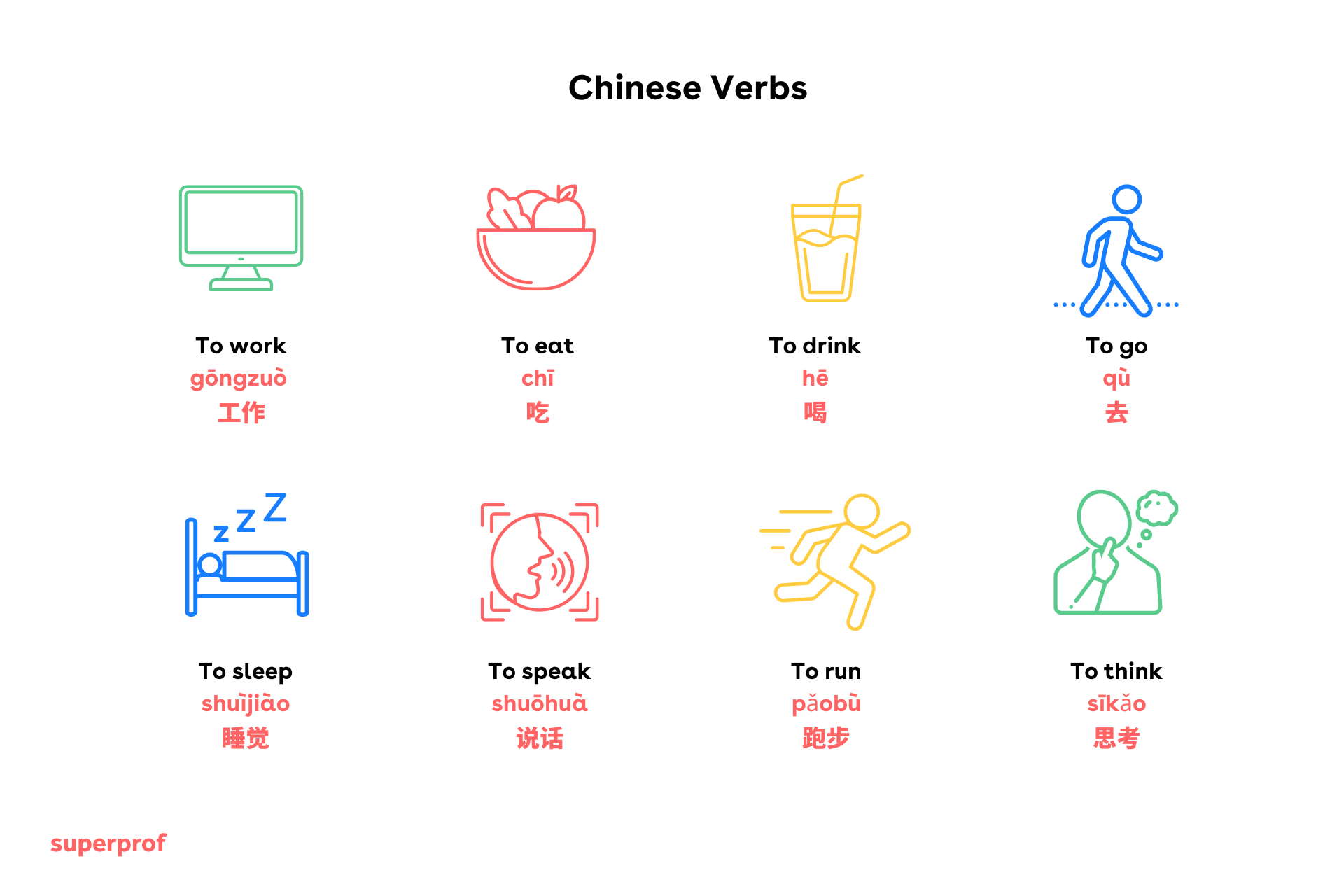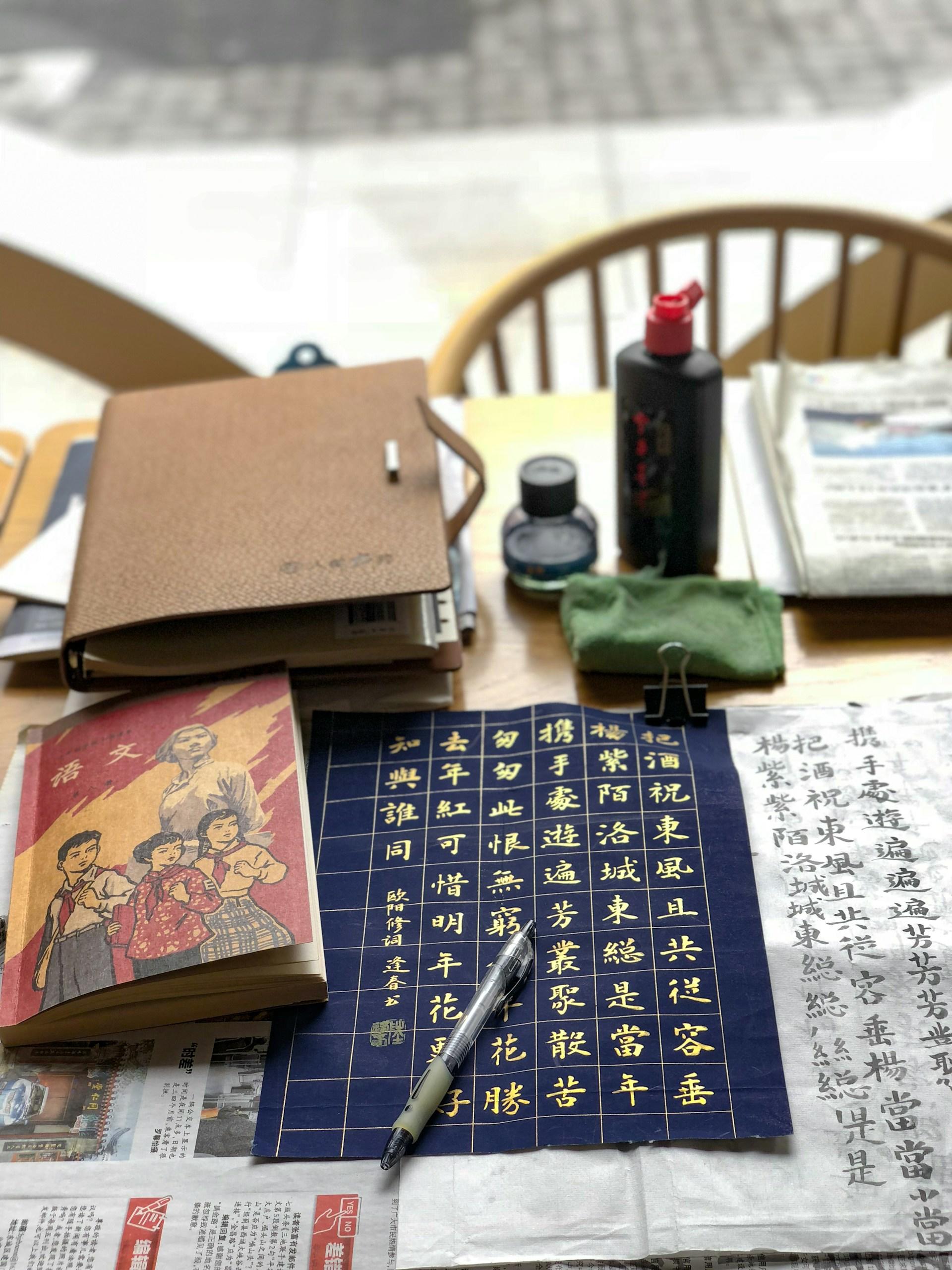Verbs are parts of speech used to help us to express ourselves clearly. All languages use verbs to one extent or another; Mandarin Chinese is no exception. But the way Mandarin speakers use verbs is simple and efficient, far easier than in most other languages. In this article, we'll look at
- how verbs work in Chinese
- the most commonly used action verbs in Chinese
- verbs to express enjoyment
- how to make a request in Chinese
Whether you have just started to learn Chinese, plan to travel to China for the first time or plan to read some Confucius. We hope to make using verbs in Mandarin Chinese easy. Let’s explore some common Chinese verbs to jumpstart our learning. When learning Chinese, some essential verbs can help you to make all kinds of sentences in Mandarin.

Basic Chinese Verbs You Should Know

Learning a few essential Chinese verbs can make everyday conversations much easier, especially if you're just starting out. Verbs like 吃 (chī - to eat), 喝 (hē - to drink), 去 (qù - to go), 来 (lái - to come), and 看 (kàn - to look/watch) are commonly used and form the foundation of many simple sentences. Mastering these basic verbs will help you build confidence as you begin speaking and understanding Mandarin in real-life situations. Here's a helpful visual to get you started:
How Do Chinese Verbs Work?
In Mandarin, verbs do not change form in written or spoken communication. This is good news for those learning Mandarin Chinese because it means you only have to learn those infinitives. The lack of conjugation is one of this language's key grammatical features but you have to know the rules about word order in Chinese. Whether asking a question or making a statement, word order is subject-verb-object (SVO).
Conjugating the verb with different Chinese verb tenses is something that you can often see in European Languages like Spanish and Italian. The verb form changes depending on who is speaking, who you are speaking to or what you are speaking about. You may be shaking your head over all this confusion but English speakers do the same - I do /you do/ he does / I did, for example.
How blissful would it be to only use the infinitive form of the verb ('to do') and be understood! With Chinese Mandarin as your second language, your wish is granted. But as a beginner Chinese learner, you may think "So how do you express time and subject without conjugating the verb?"
Mandarin includes post-verb Modal and temporal structures. They help to add context to the words and phrases we're trying to communicate. These Modal and temporal structures allow us to provide information about an aspect or order of something. They may also be used to define a specific process and even the weather.
You can expand on these by adding post-verb suffixes to make sentences richer and more detailed. You can use Post Verb suffixes to express the location, the whole process, and possibility of an action or concept. Asking someone their name is an example of such:
Essential Verb 'To Be' In Daily Chinese
The verb 'to be' (shì) is an essential verb in Mandarin. You must understand this verb to understand how to read Chinese texts. Also, you must know when it is ok to use this verb and when it is not. Direct translation from English may not always provide you with the correct way to say the same thing in Chinese.
Rules For The Verb 'To Be' 是 ( Shì ):
Examples Of How To Use (Shì):
- 我是学生。 Wǒ shì xuésheng - I am a student.
- 你是李明吗?Nǐ shì Li Ming ma? - Are you Li Ming?
- 他们是有钱人。Tāmen shì yǒuqián rén. - They are rich people.
- 你妈妈是老师吗?Nǐ māma shì lǎoshī ma? - Is your mother a teacher?
There are many ways that we use 'to be' in English that do not translate directly to the Chinese 'shì'. This means the verb 'to be' that English speakers use is actually a group of verbs in Chinese. In my Mandarin classes London, we learned early on not to make this translation mistake when speaking to native Chinese speakers. Here are the examples:
- 有用 yǒu yòng - To be Useful (lit. have use)
- 有效 yǒu xiào - To be effective (lit. have effect)
- 有名 yǒu míng - To be famous (lit. have name)
- 有意思 yǒu yì si - to be Interesting (lit. have meaning-think)
- 有钱 yǒu qián - To be rich (lit. have money)


Essential Action Verb List In Mandarin Chinese.
Learning action verbs such as have, give, eat, walk, etc., is useful and essential to speak Mandarin well. In Mandarin, action verbs are used with a particle to give more precise information. The main such particles are le, de, dao, guo, and zhe.
Le is a generic indicator of a completed action and de represents the possessive form. Dao and guo signal actions in the past and zhe represents a long-term action. Knowing this when creating your sentences will help you to improve your grammar when you speak Chinese.
Chinese Action Verbs
| Chinese Term | English Translation | Audio | |
|---|---|---|---|
| kàn | 看 | To Look | |
| zǒu | 走 | To Go | |
| nǎ | 拿 | To Take | |
| pǎo | 跑 | To Run | |
| zuò | 坐 | To Sit | |
| xuéxí | 学习 | To Learn or Study | |
| tíngzhǐ | 停止 | To Stop | |
| maí | 买 | To Buy or Sell | |
| xiě | 写 | To Write | |
| yôu | 有 | To Have |
To round out this segment, we offer these examples:
我跑了九公里。wǒ pǎo le liù gōng lǐ - I ran for six kilometres.
你去过中国。nǐ qùguo zhōngguó - you went to China
我吃了巧克力。 wǒ chī le qiǎo kè lì - I ate chocolate.
他/她/它看了电视。tā kanle dian shi - He/she/it watched television.
These particles are so much more efficient than signalling time by conjugation; isn't it great that Mandarin does not conjugate verbs?
How To Express A Request, Desire Or Need
Making yourself understood is crucial, whether it's about something you want or need. Without knowing how say what you need to say, we could end up in grave danger. Imagine having food allergies but not being able to explain that you can't have wheat or peanuts, for instance.
Learning a language is about learning how to communicate information that's important to us. Different languages give us different ways to do that. So learning straightaway how to make a request or communicate a need is crucial. Beyond that, we all want to learn our new tongue well enough to say what's important to us.
In your Chinese language course , you probably learned early on how to say '我不喜欢( wǒ bù xǐhuān)...'. That means 'I don't like…'; it's a good way to state a fact. You may elaborate by saying '我不喜欢吃肉 (wǒ bù xǐhuān chī ròu)' (I do not like to eat meat), 我不喜欢这个颜色。'wǒ bù xǐhuān zhè ge yánsè' (I don't like this colour) or 'wǒ bù è (I am not hungry).
Mandarin is a very direct language; often, you don't need to construct entire sentences to make your point clear. You can do that by saying 'bu' - a negation particle before (almost) any verb. 'bu yao!' means 'don't want!', 'bu hui' is 'can't' and 'bu xiang' means 'don't want'. Some verbs, like 'you' (to have) demand the 'mei' negation; for example 'wo mei you...' (I haven't got...).
Chinese verbs expressing will and demand
| Chinese Term | Chinese Characters | English Translation | Audio |
|---|---|---|---|
| Yào | 要 | To Want | |
| you | 有 | To Have | |
| Gěi | 给 | To Give | |
| hui | 会 | To Be Able To | |
| wèn | 问 | To Ask | |
| Juédé | 觉得 | To Feel | |
| Xuéxí | 学习 | To Learn | To Learn |
| Xiǎng | 想 | To Desire |
Specific Chinese Verbs For Enjoyment
The Chinese verb xiâng has many meanings; its definition changes depending on how it is used in a sentence. You should use it to say you're thinking about someone or something. If you miss someone, you would say 'xiang ni!'; it also means you like them. 想 xiǎng most common use is to convey a desire, to want, or to want to do something, for instance: Nǐ xiǎng qù nǎlǐ? - where do you want to go?
Xiang is a more complex verb but once you study examples of how it is regularly used you will be able to master how to use this verb. Although xiâng is typically pronounced with the third tone, it can change its tone in a sentence.
In Mandarin Chinese, tones are crucial because they change the meaning of a word. The third tone is a falling-rising tone, which means your voice drops and then rises again when you say the word. For example, xiǎng (想), which means "to want" or "to think," is normally spoken with the third tone. However, in everyday speech, the tone may shift slightly depending on the tones around it for smoother pronunciation. Understanding tones like this is key to speaking Chinese clearly and being understood.

Chinese Verbs and Phrases for Travel
Knowing how to talk about actions, situations or preferences will take you far once you're in China. It's also useful to know a few standard phrases that you can use as you travel around and make new friends. Here are a few must-know words, verbs, and phrases to add to your travelling phrasebook should you get to live in China.
- Dâdiànhuà - To phone someone.
- Huídá- To answer (the phone, people, questions).
- Chōuyān - To smoke.
- Dashu - To take water.
- Zhâo- To search (for your route, your friends, a specific place).
- Dêng- To wait ( for someone).
- Shuöhuà - To talk (with foreigners, friends, Chinese people).
Let's take a look at some of these verbs in action with some practical examples:
- Tāmen zài yīqǐ liáotiān - They talk together.
- Wǒ zài děng wǒ fùqīn - I am waiting for my father.
- Nǐ gěi wǒ shuǐ - You give me water.
- Wǒ dǎ diànhuà gěi māmā - I call mom.
- Wǒ juédé hóngchá hěn hǎo hē - I think that black tea is very good (personal appreciation).
- Wǒ zhǎoqián - I am looking for money (I am looking for work).
- Nǐ mài shū ma? - Do you sell books?.
- Wǒ měitiān dū chōuyān - I smoke every day.
To immerse yourself in fluent conversations in Chinese you have to dedicate yourself to mastering sentence structure, verbs, vocabulary and also pay attention to the tonal pronunciation of Mandarin. But you also must be able to master the most common Chinese verbs. Once you understand the structure of a sentence in Chinese, you can carry a Chinese English dictionary with you and create the perfect sentences as you go.
Summarise with AI:
















Hi, I am very grateful and want to congratulate you for putting up these crystal clear explanations on how the Chinese verbs function. I have started trying to understand and learn Chinese. I was very quick when I started with greetings and making acquaintance, but I couldn’t understand how verbs work, like when you do the negative form, interrogative form, therefore with the above explanations, I know now how to go about it, and I am able to explain to other learners, at least, the basics, on how verbs function in Chinese. Thank you for this brilliant idea.
Regards
Sam
I would like to become your friend because i will commence my Chinese classes and i need someone whom i practice . im from central America , thanks .
I found this article really useful in understanding the structure of the verbs and so on. Nonetheless, I think it could be beneficial to have the characters too, instead of only the pinyin.
great article…thanx a lot😘😘
This is an amazing article on most important verbs. Learning Mandarin is not easy. Appreciate the effort you have put in to make it clearer
I love the brief lessons you put out here. I am trying to learn a few words to help me when I finally get the courage to visit China without taking formal classes. (too old)
Thanks,
i loved your knowledge and i am grafull u ha ve shared to all us, Thanks So Much
Xie xie nîde explanation….